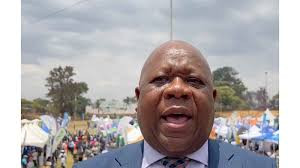
SEPTEMBER has traditionally been regarded as the Mbira month and there was a one-day festival to celebrate the mbira (African thumb piano) at Mukuvisi Woodlands in Harare. NewsDay reporter Winstone Antonio (ND) caught up with the Mbira festival founder Albert Chimedza (AC), who spoke about the mbira and related issues. Here are excerpts from the interview. ND: Is this Mbira month concept only celebrated in Zimbabwe?
AC: No. I am partly here (in the United States) to explore ways in which Mbira Month activities in the US can grow, particularly in the Zimbabwean and African-American communities. I am already looking at how we can establish the Mbira month presence in Florida, Georgia and Nevada.
The idea is to get Zimbabweans in the US to support our cause by being the authoritative ambassadors of mbira in the US. No one can sell mbira better than a Zimbabwean.
For this year, the Mbira Centre and the Mbira Institute will celebrate Mbira month in the US by participating in music and academic-related events at universities and schools in Santa Barbara, Los Angeles, Merced, Azusa and Virginia.
ND: There was an Open Mic acoustic session during the festival. Who was eligible to participate?
AC: Anyone and everyone. This is why it is Open Mic. The openness is part of the fun. The only limiting factor is that each artiste is allowed one, five-minute slot and there are 25 such slots.
ND: What importance do you attach to the mbira instrument?
AC: Our Mbira Month slogan this year was “Mbira is Our Life”. That should indicate to you how important mbira is to us. Mbira is, in my opinion, the premier Zimbabwean classical art form.
- Chamisa under fire over US$120K donation
- Mavhunga puts DeMbare into Chibuku quarterfinals
- Pension funds bet on Cabora Bassa oilfields
- Councils defy govt fire tender directive
Keep Reading
It is also a significant cultural ambassador. It is about time the country started treating it as such. If we do, the mbira will reward Zimbabweans greatly in economic, spiritual, cultural and educational ways.
ND: Do you think a lot of Zimbabweans understand this?
AC: Not enough. The country will pay dearly for not understanding and caring enough about the importance of mbira.
ND: With the digital age making demands in arts and culture, do you think the mbira still retains as much power as in the past?
AC: The technological advances are giving mbira more voice and more power. It is up to us to take advantage of those advancements.
ND: How best can Zimbabwe create a viable mbira heritage capable of creating wealth for the nation?
AC: By Zimbabweans putting their money where their mouth is. They will get very little from mbira, if they don’t invest in it.
Not just money, but business, technological, pedagogic and academic skills as well as medical and scientific skills.
The days when mbira is left to mbira players are over. Software developers should be making applications and developing mbira e-learning tools.
Financiers should be designing mbira financing schemes, lawyers should be advocating mbira-friendly legislation, educational institutions should be training the next generation of mbira makers, players, teachers, marketers, researchers, writers and academics.
I believe Zimbabweans in the Diaspora are, potentially, our strongest mbira development asset. They can help increase Zimbabwe’s international mbira presence and market share.
ND: What other projects are you doing at Mbira Centre?
AC: Training, archiving, research and development are ongoing exercises. We invest every cent we can spare in these activities.
We are constantly thinking about the future and how we can contribute to putting mbira in a better place for future generations.
A positive development in the past year has been the establishment of the social responsibility wing of our activities, the Mbira Institute, which is an applied think-tank tackling issues hindering mbira development in Zimbabwe.
We have invited Zimbabwean intellectual giants such as professors Mandivamba Rukuni and Mhoze Chikowero as well as renowned multimedia artist, Kudzanai Chiurai, to lend a hand in designing the vision of the institute.
The institute’s mandate is to develop a theoretical framework and body of knowledge relating specifically to the development of mbira and generally, to African indigenous intellectual assets and capital.
ND: What inspired you to establish the Mbira Centre?
AC: Primarily the mbira itself. I cannot properly describe how much I love and am inspired by the instrument.
There is very little in my day to day experience that I cannot relate to mbira. If I eat a piece of cake I wonder why no one is making mbira cakes.
On my flight from Addis Ababa to Los Angeles I sat next to a neuro scientist and I believe we were both amazed at how much mbira had to offer neuro science!
Essentially, my approach to mbira is heavily influenced by this experience and that of my training and experience with film. I tend to have a holistic approach and look at a task as both a creative and business enterprise. In the 1990s I lived in Los Angeles.
During that time I had the honour of being invited to Robert Redford’s Sundance Institute on a film-making fellowship for a month. That experience and my knowledge of what George Lucas was doing through his Industrial Light and Magic profoundly affected my views on how one should go about their art or craft. I try to do the same in my work with mbira.
ND: A large number of Christians associate mbira with ancestral spirits. Can this instrument be viewed just as an entertainment instrument?
AC: It’s already an entertainment instrument. I don’t think that people go to a bar or a nightclub to listen to mbira as a form of religion.
ND: Do you work with schools to ensure that this heritage is perpetuated?
AC: We do. We have had a “mbira in schools” project running since 2000. We made submissions to the new curriculum review process and I am told on good authority that many of our recommendations were taken on board.
We have presented our case to the responsible ministers on several occasions and we even had an audience with President Robert Mugabe, during which we explained our mbira vision to him and why we felt that this vision was important to Zimbabwe.
The only thing left is for more and more institutions, organisations and businesses to rally behind our effort to normalise mbira by having it imbedded in the school system as a secular musical instrument used in the study of music.
ND: Thank you for your time
AC: My pleasure











